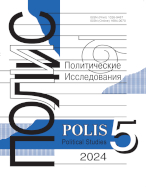Formation of Democratic Political System in Modern Russia and in Post-War Germany (Materials of a “Round Table”)
Round Table of the «Polis» Journal Formation of Democratic Political System in Modern Russia and in Post-War Germany (Materials of a “Round Table”) . – Polis. Political Studies. 2004. No. 6
On October 6 to 7, 2004, a Russian-German “round table” was held at the RF Government Financial Academy, with financial support by the Friedrich Ebert Foundation (the FRG). “Formation of Democratic Political System in Modern Russia and in Post-War Germany — Major Factor of Modernization of the State and Social Life” was its theme, and questions related to transformation of political institutions in transitional periods were discussed. Different points of view, sometimes contradictory and mutually exclusive, were expressed in the course of the discussion. In the present issue of the journal, the readers are acquainted with the views expressed by some of the participants. Professor Ya.A.Plyays, in his report, considers the dialectics of political and party systems. The report made by Professor A.I.Solovyov, deals with technologies of administering and their political reverberations in the power system of modern Russia. The attention of Cand. Sc. (Philosophy) A.V.Kulinchenko is focused on problems of correlation between the state power and society’s self-organization. Professor N.I.Shestov considers the influence of the ideas of the state’s and the country’s unity on the processes of state construction. Professor V.M.Dolgov, in his paper, analyzes political mechanisms of the interaction of the RF center and regions. In Professor M.Bube’s report, an account is given, of the role of parties in the formation of political system in post-war Germany. The communication read by M.Koss, the author analyzes the influence of the German model of federalism on the development of inter-party competition in the country.
See also:
Peregudov S.P.,
Transnational Corporations on the Way to Corporate Citizenship. – Polis. Political Studies. 2004. No3
Fyodorov K.G.,
The Policy in the Sphere of Local Taxation in Russia. – Polis. Political Studies. 2003. No4
Peregudov S.P.,
Corporate Capital and Power Institutions: Who Plays the Master?. – Polis. Political Studies. 2002. No5
Kazantzev A.A.,
Intelligentsia and Structural Innovations in Political Expanse (An Essay of Comparative Analysis). – Polis. Political Studies. 2007. No1
Sergeev V.M.,
How Are Social Changes Possible? (Prolegomena to a Statistical Theory of Social Networks). – Polis. Political Studies. 2001. No6





.jpg)






 print
print.jpg)
.jpg)
